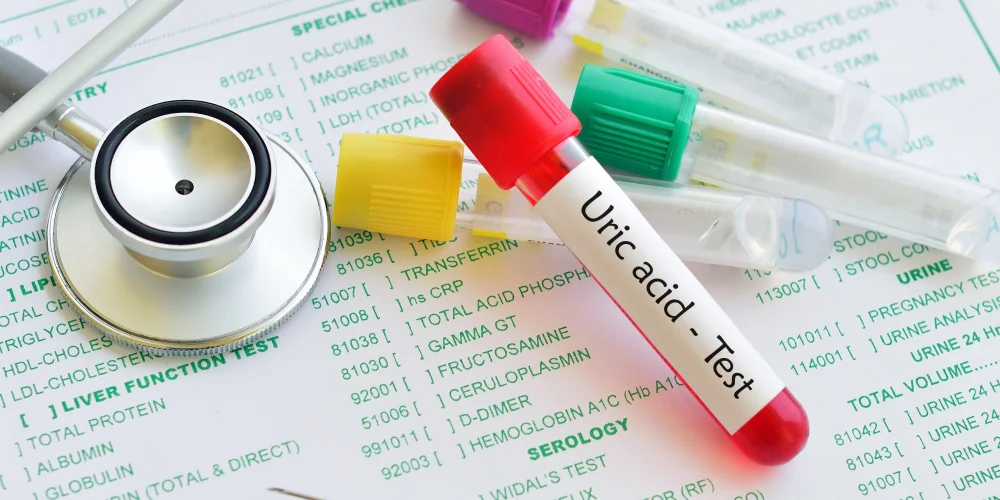Uric Acid Test
Monitoring Uric Acid Levels
It is the Serum Uric Acid (S. Uric Acid) Test determines the quantity of uric acid present in the blood of your patient. Uric acid can be described as a waste substance created by the decomposition of purines. These are substances that can be found in a variety of products and cells of humans. This test can help identify and detect conditions that can be attributed to uric acid levels that are abnormal including kidney stones, gout as well as certain metabolic diseases.

When is the S. Uric Acid Test Prescribed?
This test is recommended in various circumstances in the clinical setting to determine and track uric acids levels. It’s crucial for diagnosing the condition of gout. It is an arthritis characterized as sudden, intense joint pain, inflammation and tenderness that is caused due to uric crystal deposits. This test is also helpful in the evaluation of kidney stone formation as elevated levels of uric acids could contribute to the formation of stones derived from uric acid and assists in evaluating the efficacy of treatments. In addition it is the S. Uric Acid tests the levels of uric acids during treatment with radiation or chemotherapy which can raise the levels of uric acids. It is a key element in the investigation of metabolic disorders that impact the metabolism of uric acid like Lesch-Nyhan syndrome or any other genetic diseases.
Preparation for the S. Uric Acid Test
There is no special preparation needed for this test. Patients can consume food and drinks regularly prior to taking the test. But, it is essential to notify your doctor regarding any supplements, medications and health problems you are suffering from that could affect the results of your test. The doctor can provide directions if changes in your medications are required.
Parameters Considered During S. Uric Acid Test
It is the S. Uric Acid Test determines the amount of uric acid present in the blood of your patients, specifically looking at the level of uric acid in your serum. This test indicates the general quantity of uric acid in blood, indicating the capacity of the body to digest and expel purines with ease. This knowledge about the metabolism of uric acids are vital to detect or monitor several health problems that can be linked to high levels of uric acid which aids in the timely interventions and treatment when required.
Time Required for S. Uric Acid Test Report
It’s the S. Uric Acid Test is a quick process. Once a blood sample is taken and analyzing it, the results can be obtained in a matter of hours or the next day. This speedy turnaround time enables medical professionals to evaluate the uric acid level and advise appropriate treatment or diagnostic tests, should it be required.
S. Uric Acid Test Price
The Serum Uric Acid Test costs the price of Rs250. This low cost option will allow access the essential diagnostic testing needed for ailments that are related to the unusual levels of uric acids.
Book an Appointment for S. Uric Acid Test
Making an appointment to have an appointment for this test at Chirayu SuperSpeciality Hospital is straightforward. The test can be scheduled via our online portal or get in touch with our team. We’re dedicated to providing prompt and efficient support to help you meet your healthcare demands.
What Our Patients Say
Hear from our valued patients about their experiences at Chirayu Super Speciality Hospital and how our care has made a positive impact on their health and well-being.


Found the test very informative. Helpful in understanding my metabolic health. Thank you, Chirayu!


Accurate diagnosis of gout symptoms. Excellent service and supportive staff. Very satisfied with results.


Helpful in managing my metabolic disorder. Convenient and affordable testing at Chirayu Hospital.


Reliable testing, essential for tracking kidney stone risks. Great experience with knowledgeable staff.


Efficient service, clear explanations, and quick results. Vital for monitoring uric acid levels.


Fast results helped manage gout effectively. Highly recommend for accurate diagnosis and treatment.
Frequently Asked Questions
Here, we provide answers to some of the most commonly asked questions to help you better understand our services, policies, and facilities. If you have any additional questions, please do not hesitate to contact us.
The normal range for serum uric acid levels is typically 3.5 to 7.2 mg/dL for men and 2.6 to 6.0 mg/dL for women. However, this range may vary slightly depending on the laboratory.
Yes, diet can affect uric acid levels. Foods high in purines, such as red meat, shellfish, and sugary beverages, can increase uric acid levels in the blood.
Gout is typically treated with medications to reduce pain and inflammation, as well as drugs that lower uric acid levels. Lifestyle changes, such as dietary modifications and increased hydration, are also recommended.
Yes, certain medications can affect uric acid levels. It is important to inform your healthcare provider about all medications and supplements you are taking before the test.
The frequency of testing depends on your individual health condition and the recommendations of your healthcare provider. Patients with gout or those undergoing treatment for high uric acid levels may need more frequent testing.